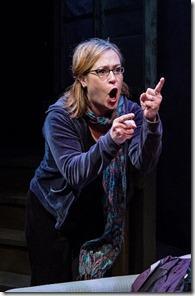
Thinner Than Water
Written by Melissa Ross
Directed by John Gawlik
The Gift Theatre, 4802 N. Milwaukee (map)
thru May 25 | tickets: $35 | more info
Check for half-price tickets
Read review
Yet another ‘dysfunctional family’ play
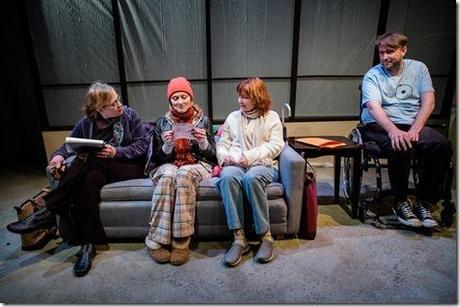
The Gift Theatre presents
Thinner Than Water
Review by Patrick Dyer
The dysfunctional family. It’s practically the staple subject matter in American theater for the last hundred years from Tracy Letts’ August: Osage County to Sam Shepard’s Buried Child to Eugene O’Neill’s, well, anything. It’s tempting for playwrights to try out because it obviously lends itself to ensemble drama and high tensions between characters. That is, if the characters and the situation they’re in are strong enough to warrant it. Is that the case with Melissa Ross’s Thinner Than Water?
The play takes place in the suburbs of an unnamed city where it’s always raining and where three half-siblings – Cassie (Brittany Burch), Renee (Lynda Newton), and Gary (Michael Patrick Thornton) – are forced to reunite and confront their personal differences through their father Martin’s illness. Renee is the older and (supposedly) more responsible sister who can’t quite keep her marriage to husband Mark (Paul D’Addario) intact. Gary is a wheelchair-bound, pot smoking comic book storeowner who can barely keep himself committed to anything in his life, like being the “big brother” to the son of his friend, Angela (Darci Nalepa). Cassie, the youngest of the three, is a freelance artist struggling to find work and maintain her love life with her often-dumped boyfriend Henry (Jay Worthington). As their father’s health deteriorates more and more, these half-siblings must learn to overcome their differences and become the family they’ve always wanted to be.
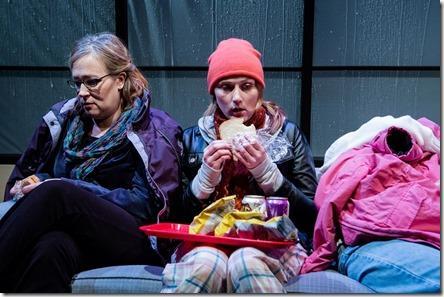
Not only is the basic premise of Thinner Than Water tired beyond reason, playwright Ross doesn’t make her characters or their situation compelling enough to warrant it. And that has to do with the fact that there’s almost no tension between the siblings. Instead, what we get are the siblings constantly insulting each other without proper setup or framing. Halfway through the second act, I questioned whether or not these siblings ever loved each other at all. I felt very little for them because, quite frankly, they’re not engaging enough to spend two hours in the theater with. Renee is just downright despicable in the constant way she insults her loved ones (including a wheelchair-bound brother) and having the weakest reason for it: because she’s unhappy with her own life. Gary comes across as too passive to be taken seriously, even during his more serious moments. And Cassie is too indecisive and immature for her internal dilemmas to have any high stakes. Most of the other characters are too sketchily developed in their relationships with the siblings, and their presence feels ultimately superfluous. Did we really need to see Gary being verbally abused by Angela in a public cafe just because he didn’t show up to play with her son? Was there no other point of having Benjy (Gabe Franken), Gary’s co-worker and friend, other than to be an awkward last-minute romantic interest for Cassie?
Ross’s dialog is often bland and “naturalistic” (which honestly doesn’t work in the theater), she relies too much on obscenities to try to sound “witty,” her attempts at darker comedy often fall flat, and the scenes that are supposed to be “raw” are just uncomfortable and distancing since her characters aren’t fleshed out enough to be believable. For a play that wants to be like August: Osage County or Buried Child, Ross makes the mistake of having Thinner Than Water set in multiple locations and over a long period of time. What makes family plays like August… and Buried Child work are their single settings because it creates a claustrophobia for the characters, causing the tension to build between them until they explode. When the characters in this play lash out at each other, it just feels like casual insulting because there’s nothing boiling underneath them. But tension isn’t the only thing lacking here: what is sorely lacking is Martin, the father. Of all the superfluous characters here like Angela and Benjy, why don’t we see the father, i.e., the reason why the siblings are together in the first place? Without any scenes with Martin, we never get a clear image of the connection each of the siblings have with him, and without that why should we even care whether or not they come together as a family?
Director John Gawlik keeps the rain falling throughout this play, giving it a distinctly dreary atmosphere. And it turns out that that’s appropriate since this is in fact a very dreary play. I felt like I was slopping along through a rainstorm out in the streets while watching, and couldn’t wait to find a better and drier spot. Thankfully, I did find relief in the character of Gwen (Donna McGough), Martin’s current girlfriend. Not only is she the most developed and engaging character in the play, she’s also the most dynamic. She starts off as overly nice, trying to cope with possibly losing her lover with a lot of “small talk”, but when the three siblings keep overly insulting each other, she lashes out and just wants to get through this ordeal without any meaningless conflict. You feel her pain, because you feel her connection with Martin more than anyone else, especially in the line: “I loved Martin the most when he was pissed off at the world.” Her relationship with Martin was the most clear, and I sympathized with her the most because of that. In fact, I wished the play had focused more on her and less on the siblings. Of course, that also represents a problem with the play because the three lead characters that should have the clearest connection to the father are overshadowed by a supporting character. That’s not to say the rest of the cast aren’t competent; they are. But their characters are so two-dimensional that it’s hard to find any performance that stands out more than McGough’s humane and dynamic portrayal of Gwen.
Thinner Than Water lacks the tension, stakes, and compelling characters to warrant such an overdone premise. I didn’t care about the characters I was supposed to care about. And the one character I wasn’t meant to connect with, I did. A dreary play with one bright spot – is that enough to tread through this rainy day?
Rating: ★★
Thinner Than Water continues through May 25th at The Gift Theatre, 4802 N. Milwaukee (map), with performances Thursdays-Saturdays at 7:30pm, Sundays 2:30pm. Tickets are $35, and are available via phone (773-283-7071) or online through their website (check for half-price tickets at Goldstar.com). More info at TheGiftTheatre.org. (Running time: 2 hours 10 minutes, includes an intermission)
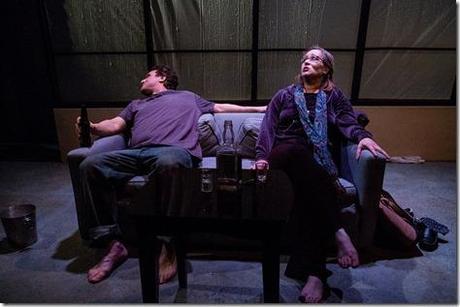
Photos by Claire Demos
artists
cast
Lynda Newton (Renee), Michael Patrick Thornton (Gary), Brittany Burch (Cassie), Donna McGough (Gwen), Darci Nalepa (Angela), Jay Worthington (Henry), Gabe Franken (Benjy), Paul D’Addario (Mark)
behind the scenes
John Gawlik (director), Joe Schermoly (set design), Michael Stanfill (lighting design, projections), Kate Murphy (costume design), Peter Storms (sound, design, original music), Sarah Luse (stage manager), David Preis (technical director), Claire Demos (photos)
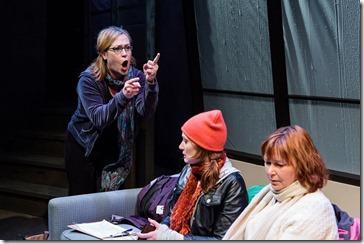
14-0408

